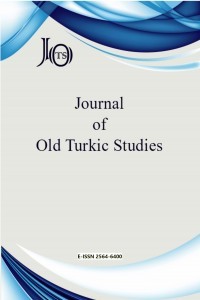Eski Anadolu Türkçesi Dönemine Ait Bir Hikâye: Aksaraylı Îsâ: Hikâyet-i Şuhmâ [06 Mil Yz A 6823/2]
Old Anatolian Turkish, story, masnavi, Islamic religion, Aksaraylı Îsâ
A Story From Old Anatolian Turkish Period: Aksarayli Îsâ: Hikâyet-i Şuhmâ [06 Mil Yz A 6823/2]
Old Anatolian Turkish, story, masnavi, Islamic religion, Aksaraylı Îsâ,
___
- AKALIN, Ş. H. vd. (2011). Türkçe Sözlük, 11. Baskı, Ankara: Türk Dil Kurumu Yayınları.
- AYVERDİ, İ. (2006). Misalli Büyük Türkçe Sözlük I-III, İstanbul: Kubbealtı Yayınları.
- CLAUSON, Sir G. (1972). An Etymological Dictionary of Pre-Thirteenth Century Turkish, Oxford: Oxford University Press.
- ÇAĞBAYIR, Y. (2007). Orhun Yazıtlarından Günümüze Türkiye Türkçesinin Söz Varlığı, Ötüken Türkçe Sözlük I-V, İstanbul: Ötüken Yayınları.
- DEMİRCİ, Ü. Ö. & Ş. KORKMAZ (2008). Şeyyâd Hamza, Yûsuf ve Zelîhâ (Giriş-Metin-Günümüz Türkçesine Aktarma-Dizin ve Sözlük-Tıpkıbasım), İstanbul: Kaknüs Yayınla-rı.
- DEVELLİOĞLU, F. (2007). Osmanlıca-Türkçe Ansiklopedik Sözlük, Ankara: Aydın Kitabevi.
- DİLÇİN, C. (1991). Mes’ûd Bin Ahmed, Süheyl ü Nev-Bahâr (İnceleme-Metin-Sözlük), Ankara: Türk Dil Kurumu Yayınları.
- HİKÂYE (1971). Meydan Larousse, İstanbul, Meydan Yayınları, 5: 850-851.
- HİKÂYE (1981). Türk Dili ve Edebiyatı Ansiklopedisi, İstanbul, Dergâh Yayınları, 4: 225-230.
- KORKMAZ, Ş. & T. KORKMAZ BULUT (2019). “Eski Edebiyatımızda Hırsızlık Konulu Mensur Bir Hikâye: Hikâyet-i Uğru Abbâs”, Hırsızlık Kitabı, Ed. E. GÜRSOY-NASKALİ, Kitabevi Yayınları, İstanbul: 467-478.
- KORKMAZ BULUT, T. & Ş. KORKMAZ (2019). “Yûsuf-ı Meddâh’ın Kadı ile Uğru Hikâyesi: Günümüz Türkçesine Çevirisi”, Hırsızlık Kitabı, Ed. E. GÜRSOY-NASKALİ, Kitabevi Yayınları, İstanbul: 479-510.
- KORKMAZ, [BULUT] T. (2017). Arzu ile Kanber Hikâyesi [Milli Kütüphane Nüshası 06 Mil Yz A 8618 ve Konya Nüshası 42 Kon 1882/2], (İnceleme-Metin-Çeviri-Dizin ve Tıpkı-basım), Marmara Üniversitesi, Türkiyat Araştırmaları Enstitüsü, İstanbul. [Yayımlanmamış Doktora Tezi]
- KORKMAZ, Ş. (2012). Eski Anadolu Türkçesine Ait Bir Manzum Hikâye Mecmuası (İnceleme-Metin-Çeviri-Dizin ve Tıpkıbasım), Marmara Üniversitesi, Türkiyat Araştırmaları Enstitüsü, İstanbul. [Yayımlanmamış Doktora Tezi]
- KÖKTEKİN, K. (2007). Yûsuf-ı Meddâh, Varka ve Gülşah (İnceleme-Metin-Dizin), Ankara: Türk Dil Kurumu Yayınları.
- MENİNSKİ, Franciscus á Mesgnien (2000). Thesaurus Linguarum Orientalium Turcicae-Arabicae-Persicae, Lexicon Turcico-Arabico-Persicum I-III, Grammatica Turcica IV, Onomasticum V, Index der türkischen Wörter VI, mit einer Einleitung und mit einem türkischen Wortindex von S. STACHOWSKİ, sowie einem Vortwort von M. ÖLMEZ. İstanbul: Simurg. İstanbul.
- Örnekleriyle Türkçe Sözlük I-IV (1995). Ankara: Millî Eğitim Bakanlığı Yayınları.
- ÖZKAN, M. (2009). Türk Dilinin Gelişme Alanları ve Eski Anadolu Türkçesi, İstanbul: Filiz Kitabevi.
- RÄSÄNEN, M. (1969). Versuch eines etymologischen Wörterbuchs der Türksprachen, Helsinki: Suomalais-Ugrilainen Seura.
- SARAÇBAŞI, M. E. (2010). Örnekleriyle Büyük Deyimler Sözlüğü I-II, İstanbul: Yapı Kredi Yayınları.
- STEİNGASS, F. J. (1975). A Comprehensive Persian-English Dictionary, Beirut: Librairie du Liban Publishers.
- Şemseddin Sâmi (1985-1986). Temel Türkçe Sözlük I-III (Sadeleştirilmiş ve Genişletilmiş Kâmûs-ı Türkî), İstanbul: Tercüman Gazetesi Yayınları.
- TUĞLACI, P. (1971). Okyanus 20. Yüzyıl Ansiklopedik Türkçe Sözlük I-III, İstanbul: Pars Yayınevi.
- TULUM, M. (2011). XVII. Yüzyıl Türkçesi ve Söz Varlığı, Ankara: Türk Dil Kurumu Yayınları.
- Türkiye’de Halk Ağzından Derleme Sözlüğü I-XII (1993). 2. Baskı, Ankara: Türk Dil Kurumu Yayınları.
- XIII. Yüzyıldan Beri Türkiye Türkçesiyle Yazılmış Kitaplardan Toplanan Tanıklarıyla Tarama Sözlüğü I-VIII (1996). 2. Baskı, Ankara: Türk Dil Kurumu Yayınları.
- YAĞCI, Ş. (2002). “Klasik Türk Edebiyatı Geleneğinde Hikâye”, Türk Dünyası Araştırmaları, 141: 147-160.
- ZENKER, J. T. (1866). Türkisch-Arabisch-Persisches Handwörterbuch, Leipzig.
- Yayın Aralığı: Yılda 2 Sayı
- Başlangıç: 2017
- Yayıncı: Erdem UÇAR
The New Dädä Qorqut Tales from the Recently-Found Third Manuscript of the Book of Dädä Qorqut
Eski Anadolu Türkçesi Dönemine Ait Bir Hikâye: Aksaraylı Îsâ: Hikâyet-i Şuhmâ [06 Mil Yz A 6823/2]
Türkiye’deki Eski Uygurca Metin Neşirleri İçin Kullanılacak Harfçevrim ve Yazıçevrim Kılavuzu
Orta Asya’nın “Bin Şehir Ülkesi”: Baktria
Horezm Türkçesi ile Yazılan Kur’ân Tercümesinin Meşhed Nüshasından Bazı Parçalar (IV)
A Volga Bulgarian Classifier: A Historical and Areal Linguistic Study
